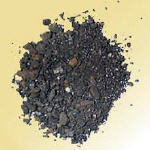
Western mineral firms are fuelling violence in the Democratic Republic of Congo by failing to check where their raw materials come from, activists say.
Global Witness says companies sourcing minerals used in electronic gadgets are buying them from traders who finance rebel and government troops.
It calls for the UK-based Amalgamated Metal Corporation (AMC) and others to have assets frozen over the issue.
AMC, whose subsidiary Thaisarco sources tin from DR Congo, denies the claims.
The Global Witness report focuses on the troubled region of eastern DR Congo, where various rebel groups and government troops control large parts of the trade in minerals including coltan, cassiterite and gold.
They use the industry to fund conflicts which have seen some 100,000 people displaced from their homes in recent months, in addition to mass killings and rapes, mostly in North and South Kivu provinces.
Millions 'need mining'
The report accuses Thaisarco and other companies of failing to check the source of the metals that go to its smelters before they end up in electronic goods.
"Global Witness is calling on the UK government to request that the UN Sanctions Committee add the UK-based entities of AMC and their directors to the list of companies and individuals against whom sanctions should be imposed," the group said.
It quoted a UN resolution as saying that anyone supporting illegal Congolese armed groups through illicit trade of natural resources should be subjected to sanctions including travel restrictions and an assets freeze.
The report acknowledges that the companies are acting legally, but says some of their suppliers are laundering minerals which come from the military or rebel groups.
AMC has strongly denied the claims, saying it is taking part in an industry-wide initiative started on 1 July this year to trace the source of metals.
The firm said in a statement that it takes its lead from the United Nations.
"If the UN were to decide that a withdrawal from the trade is the most appropriate way forward, then Thaisarco would comply absolutely with their requirements," the statement said.
"However, it is believed that such an approach would be to the detriment of large numbers of artisanal miners and their dependents in the DRC."
The firm quoted World Bank data suggesting up to 10 million people rely on mining in DR Congo.
Related articles
- • European Union Sanctions Rwanda and M23 Officials over Congo Conflict (March 17, 2025)
- • Tshisekedi Announces Government of National Unity and Calls for Unity Against M23 Rebels (February 23, 2025)
- • DR Congo Scores High on Growth, Lags in Poverty Reduction: IMF (October 13, 2015)
- • Congo Improves Natural Resources Accounting (July 4, 2014)
- • Regional Leaders Sign DR Congo Peace Deal (February 24, 2013)
- • Widespread abuse of logging permits opens up Congo's forests to more destruction (October 25, 2012)
- • U.S. SEC requires company disclosures on use of DR Congo minerals (August 23, 2012)
- • U.S. and U.K. Must Tell Rwanda to Stop Supporting Rebels in DR Congo, Global Witness Says (June 29, 2012)
- • ICC Prosecutor Seeks New Charges Against Ntaganda, FDLR Leader (May 14, 2012)
- • DR Congo, IMF to Co-Host Conference on the Management of Natural Resources (March 13, 2012)
- • $70 Million in Congo Mining Revenue Untraceable, Investigators Say (March 5, 2012)
- • 32 Million Congolese Voters Set to Elect Their Leaders (November 27, 2011)
- • Rwanda gives DR Congo back tonnes of smuggled minerals (November 3, 2011)
- • UN advises prudent use of abundant resources to spur development (October 10, 2011)
- • DR Congo growth above 7 percent in 2010 - IMF (September 3, 2011)
- • Case of UN Employee Caught Smuggling Minerals Not Unique (August 25, 2011)
- • UN Employee Arrested for Trying to Smuggle Tin Ore (August 22, 2011)
- • Controversy over "conflict minerals" law (August 2, 2011)
- • Global Witness welcomes DR Congo's decision to publish resource contracts (June 3, 2011)
- • Opportunity for change in eastern Congo's mines must be seized (May 18, 2011)
- • Gold smugglers charged in Kenyan court (May 12, 2011)
- • New Law Aims to Halt Sale of Conflict Minerals (April 18, 2011)
- • New rules for miners (March 17, 2011)
- • Plight of the Congo Is Focus of U.S. Congress Hearing (March 8, 2011)
- • Kabila, Kibaki meet over smuggled gold from eastern Congo (March 6, 2011)
- • Mining ban fails to end armed control of trade, says Global Witness (March 4, 2011)
- • Foreign 'gold smugglers' arrested in eastern Congo (February 7, 2011)
- • Great Lakes Regional Summit to Focus on Congo Resource Exploitation (December 15, 2010)
- • Companies Struggle in Conflict Mineral Index (December 14, 2010)
- • WikiLeaks Founder Arrested in London (December 7, 2010)







